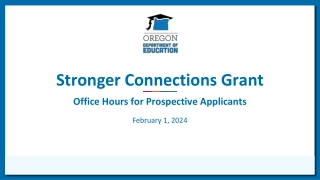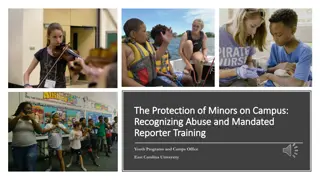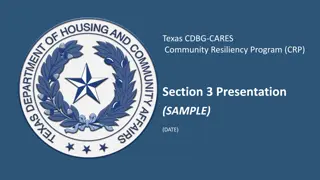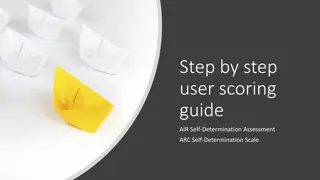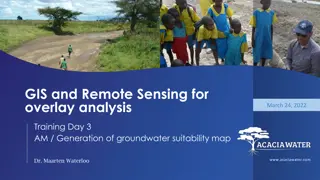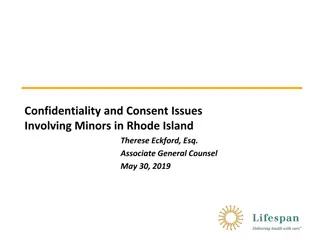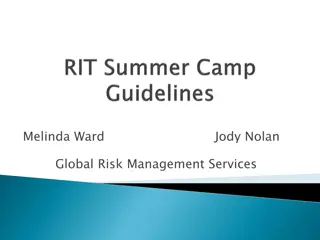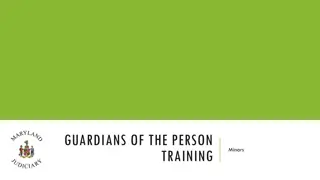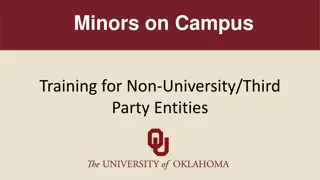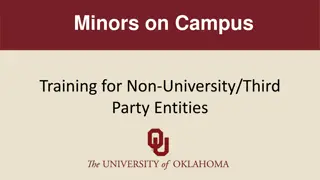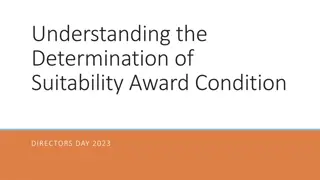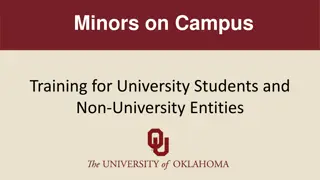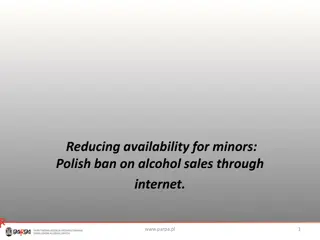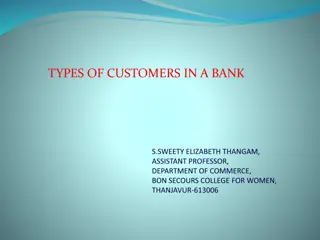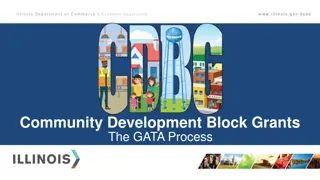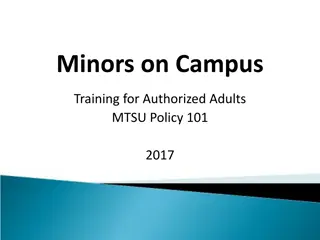Suitability Determination for Working with Minors in Grant Conditions
The Department of Justice (DOJ) grant condition requires a determination of suitability for individuals interacting with minors under funded programs. Covered individuals must be assessed for suitability in advance to ensure safe interactions with participating minors. Exemptions for specific types of contact are outlined, and the scope includes various programs benefitting minors. For detailed information, references to DOJ and OVW websites are provided.
Download Presentation

Please find below an Image/Link to download the presentation.
The content on the website is provided AS IS for your information and personal use only. It may not be sold, licensed, or shared on other websites without obtaining consent from the author.If you encounter any issues during the download, it is possible that the publisher has removed the file from their server.
You are allowed to download the files provided on this website for personal or commercial use, subject to the condition that they are used lawfully. All files are the property of their respective owners.
The content on the website is provided AS IS for your information and personal use only. It may not be sold, licensed, or shared on other websites without obtaining consent from the author.
E N D
Presentation Transcript
Suitability to Work with Minors Determination
Background This is a Department of Justice (DOJ) grant condition First appeared in the Federal Fiscal Year (FFY) 2019 awards for VOCA and VAWA Passed on to subgrantees in State Fiscal Year (SFY) 2021 for VOCA subawards and Calendar Year (CY) 2020 for VAWA subawards SASP and VSTOP
Background DOJ Office on Violence Against Women administers STOP and SASP Issued some guidance immediately DOJ Office of Justice Programs/Office for Victims of Crime administers VOCA No guidance until 2023 Now that both funding offices have issued aligned guidance for implementation, DCJS incorporated this condition into our monitoring tool
Grant Award Condition: Determination of suitability required, in advance, for certain individuals who may interact with participating minors The recipient (and any subrecipient at any tier) may not permit any covered individual to interact with any participating minor in the course of activities under the award, unless the recipient or subrecipient first has made a written determination of the suitability of that individual to interact with participating minors The full text and details of this special condition are posted on the OJP and OVW websites at: https://ojp.gov/funding/Explore/Interact-Minors.htmand https://www.justice.gov/ovw/award-conditions
What is a Covered Individual? Any individual who is expected, or reasonably likely, to interact with any participating minor, this includes employees and volunteers Exemptions: Incidental contact Accompanied contact
Types of Program Covered Applies to a program if a purpose of some or all of the activities that would be carried out under the award is to benefit minors. There's no specific type of program that is subject to this award condition. It can be services for victims of child abuse, domestic violence shelters, trauma recovery centers, et cetera. The key is not the type of program but the purpose of an activity under the program.
Implementation Determination must be made before interaction with minors occur Determination must be documented and repeated every five years
Implementation Determination of Suitability The condition lists required searches that must be completed no earlier than six months prior to the determination being made: A fingerprint search (if not legally available, a name-based search) for the criminal history registry for each state in which the individual lives, works, or goes to school, or has lived, worked, or gone to school at any time during the past five years; the criminal history registry for each state in which he or she is expected to, or reasonably likely to, interact with a participating minor in the course of activities under the award.
Implementation Determination of Suitability Required Searches Continued: Public sex offender and child abuse websites/registries including: the Dru Sjodin National Sex Offender Public Website (www.nsopw.gov); the website/public registry for each state (and/or tribe, if applicable) in which the individual lives, works, or goes to school, or has lived, worked, or gone to school at any time during the past five years; and the website/public registry for each state (and/or tribe, if applicable) in which the individual is expected to, or reasonably likely to, interact with a participating minor in the course of activities under the award.
Implementation Determination of Suitability Other factors may be considered, including if the individual: Withholds consent to a criminal history search required by this condition Knowingly makes (or made) a false statement that affects, or is intended to affect, any search required by this condition Is listed as a registered sex offender on the Dru Sjodin National Sex Offender Public Website;
Implementation Determination of Suitability Other factors to be considered continued: Has been convicted (felony or misdemeanor) of sexual or physical abuse, neglect, or endangerment of an individual under the age of 18 at the time of the offense; (2) rape/sexual assault, including conspiracy to commit rape/sexual assault; (3) sexual exploitation, such as through child pornography or sex trafficking; (4) kidnapping; (5) voyeurism Is determined by a federal, state, tribal, or local government agency not to be suitable.
Implementation Determination of Suitability Again, after the required searches are completed a written determination of suitability must be made and retained by the subrecipient onsite. Criminal history results are not be disclosed to DCJS. The subrecipient can do more than listed in the condition but not less.
Fingerprint Searches The Virginia State Police (VSP) processes fingerprints and criminal record searches. In order to have access to the VSP Non-Criminal Justice Interface (NCJI) portal, your organization must do the following: A dated and signed letter (on agency letterhead), by your Administrator, Director, or Manager, etc. addressed to the attention of NCJI Accounts , stating you are interested in obtaining a Virginia State Police charge account for the purpose of processing criminal record checks for your employees . See VSP guidance document for additional details.
Fingerprint Searches contd. If your agency meets the criteria for an account and is approved by the VSP Lieutenant, your Agency Head will receive a contract and charge account form to complete. Each authorized user will have their own User ID and password assigned to them. Any sharing of User IDs and/or passwords with anyone will put you out of compliance with your Virginia State Police contract. Creating your NCJI account can be a lengthy process, as there are other sections within the Virginia State Police that also have part in creating your account. Therefore, until your account can be created and activated, please continue to submit the paper SP-167 or SP-230 forms via USPS. Forms can be generated at https://vsp.virginia.gov/services/criminal-background/. Email your account request letter and any attachments to ncjihelp@vsp.virginia.gov.
Fingerprinting for Noncriminal Justice Purposes Noncriminal justice entities that have existing accounts with VSP for criminal history records checks have the option to create separate accounts with Fieldprint, the Commonwealth s fingerprint collection and transmission vendor, if they do not have another available means for obtaining fingerprints. These entities include: State and local government agencies conducting background checks on prospective employees and contractors or for licensing purposes. EMTS and other first responders (except law enforcement). Private schools, volunteer agencies, non-profits, and others providing care to children, the elderly, and the disabled.
Fingerprinting for Noncriminal Justice Purposes Fieldprint, an approved electronic provider on state contract, has existing contracts with several state agencies and local government entities to provide fingerprinting services. Fieldprint s website is https://www.fieldprintvirginia.com. An account can be established by emailing customerservice@myfieldprint.com or calling (888) 472-8918. For more information, visit: https://vsp.virginia.gov/services/fingerprinting/.
Central Registry (Child Abuse History) The Virginia Child Abuse and Neglect Central Registry is mandated by the Virginia Child Protective Law. The search of the central registry is a check to determine if the person has ever been the subject of a founded complaint of child abuse or neglect in Virginia. Child abuse searches are conducted through https://centralregistry.dss.virginia.gov/crs/s/?language=en_US. This web-based portal provides access for programs, facilities, and providers to create a profile to submit and pay for Central Registry Search requests based on 63.2-1515 and Portability requests, as applicable, based on 22.1 -289.035. ($10/request) Providers and Facilities licensed and regulated by the Virginia Department of Social Services (VDSS), such as child placing agencies and children s residential facilities, will have access to the OBI web-based portal once they have registered and verified the account through the VDSS Virginia Enterprise Licensing Application (VELA). the Office of Background Investigations (OBI):


